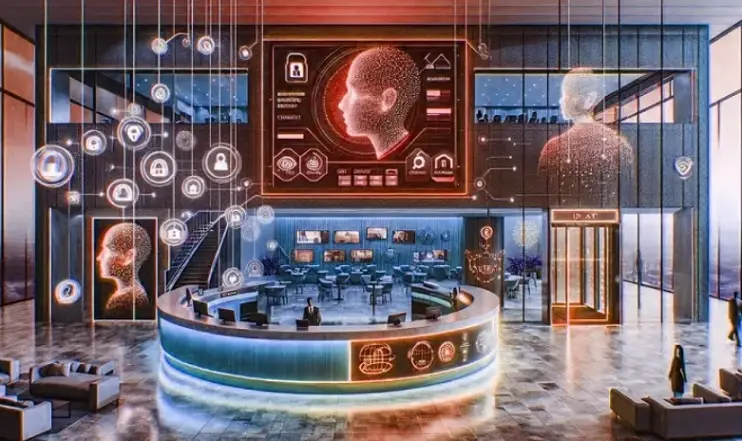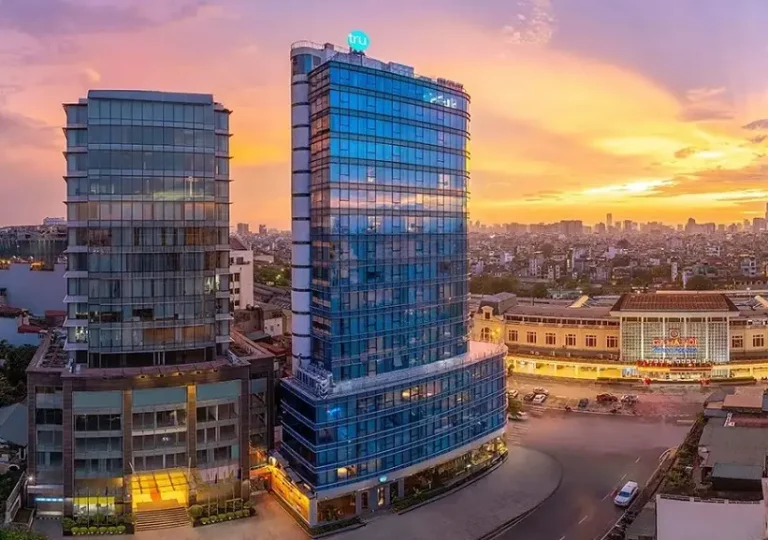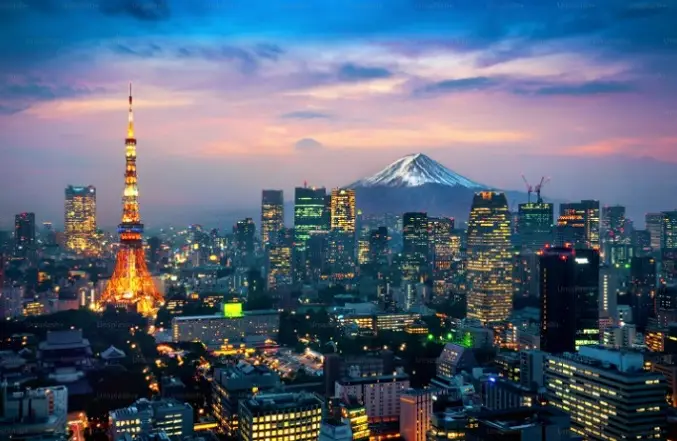
Bangkok Hotel Technology News: As guests demand higher levels of safety and hospitality providers face increasingly complex challenges, a new ally has emerged for the modern hotelier—artificial intelligence. Long relegated to science fiction or the tech sphere, AI is now finding its place in the lobbies, corridors, and back-end systems of Thailand’s luxury resorts and urban business hotels, revolutionizing security and operational strategy in ways that feel almost invisible to the guest—but crucial to the operator.

Image Credit: AI-Generated
This Bangkok Hotel Technology News report explores how AI is redefining hotel security, not just as a reactive defense mechanism, but as a proactive, intelligent infrastructure that helps hoteliers preempt threats, optimize manpower, and deliver a seamless guest experience.
From Reactive to Proactive Security
Traditionally, hotel security has relied on human personnel, surveillance cameras, alarms, and forensic tools that only become useful after an incident occurs. However, this paradigm is shifting rapidly. AI-based systems are now offering real-time threat detection, behavioral pattern recognition, and automated responses that were once only imagined in futuristic thrillers.
Think of the average hotel with dozens—or hundreds—of security cameras, motion detectors, keycard access logs, and environmental sensors. Until recently, the data from these systems was disjointed, sitting in isolated silos. But with AI acting as a centralized analytical brain, the system now behaves like a nervous system—capable of “seeing,” “hearing,” and even “thinking” in response to stimuli. For example, AI can analyze live footage to detect loitering in restricted zones, unattended luggage, unauthorized entries, or even behavioral anomalies such as erratic guest movement or entry into restricted areas.
Real-Time Data Means Real-Time Action
One of the most powerful advantages AI brings to the table is its ability to drastically improve response times. No more waiting for a security guard to scroll through hours of video footage to understand what happened. With AI, systems are trained to recognize threats instantly and issue alerts that contain specific data—including license plate numbers, suspect appearances, or real-time movement tracking.
Take, for instance, the detection of a glass-breaking sound in a hotel parking lot. AI can instantly differentiate whether it’s a case of vandalism or merely someone retrieving car keys. If it’s the former, the system can immediately contact local law enforcement with detailed visuals and contextual data.
AI also shines in emergency situations such as fires or lockdowns. By analyzing live feeds and environmental sensors, it can detect the severity and location of an incident and guide both staff and guests safely—often before human intervention even begins.
Guarding the Hotel’s Most Vulnerable Zones
Certain hotel areas—like porte-cocheres, back entrances, or isolated stairwells—are inherently more vulnerable and require continuous monitoring. Security staff, no matter how skilled, can be stretched thin across expansive properties. AI, however, never sleeps. Once deployed across strategic points with cameras and sensors, it remains vigilant around the clock.
This is particularly useful during shift changes, major events, or when a significant part of the security team is occupied with another issue. With its tireless attention to every feed, AI can ensure no blind spots remain—even when human teams are compromised by fatigue, multitasking, or distraction.
Seeing Into the Future
Perhaps one of AI’s most intriguing uses is in predictive analytics. By studying historical incident reports, patterns of foot traffic, and peak times for various threats, AI can help security managers anticipate risks before they happen. This means staff deployment can be fine-tuned, high-risk zones can be prioritized, and resources can be efficiently distributed throughout the property.
And AI’s usefulness doesn’t end with physical safety. These predictive models can be leveraged for broader hotel operations—like improving guest flow, enhancing marketing strategies, or optimizing digital signage. For example, if the system detects an uptick in guest traffic toward the pool area, management can redirect foot traffic using screens to promote less crowded venues like an on-site spa or rooftop bar.
Upgrading Traditional Tools with Smart Capabilities
AI doesn’t always require a complete hardware overhaul. In many cases, existing infrastructure like door alarms, motion detectors, or surveillance cameras can be retrofitted with AI-compatible software. This allows hotels to enhance their current systems rather than replace them entirely.
Take intrusion detection. Previously, these systems operated linearly: one trigger, one output. Now, AI adds layers of probability and context, creating dynamic, situation-based responses. A door sensor doesn’t just send an alert when triggered—it considers time of day, area traffic, guest movements, and other metrics to determine the threat level.
AI-Powered Identity and Access Control
AI also elevates identity verification through biometrics. Facial recognition, fingerprint scans, and iris detection can now be processed against databases in real time, enabling or denying access to specific hotel areas instantly. This can be especially useful in high-security zones such as executive lounges, data centers, or VIP-only venues.
By automating this process, hotels reduce reliance on keycards, which can be lost, stolen, or misused. This not only bolsters security but also creates a smoother, more modern guest experience.
Smarter Surveillance and Motion Detection
Older video systems simply recorded footage. Reviewing that content often took hours, if not days. AI changes this entirely. Whether integrated at the server level or within individual cameras, AI can now monitor based on color, shape, contrast, and even emotional expression.
For example, an AI-powered surveillance system can immediately flag if someone enters a staff-only kitchen, lingers near elevators at odd hours, or tailgates through secure doors. Paired with motion sensors that discern between a moving vehicle and a swaying tree, AI helps reduce false alarms and optimize staff attention.
Advancing Weapons Detection
Perhaps one of the most sophisticated AI applications in hotel security is weapons detection. Modern AI-enabled scanning portals no longer rely solely on traditional metal detection. Instead, they use density, shape, and database comparisons to calculate the likelihood that someone is carrying a weapon. This can be critical for hotels hosting high-profile events, international guests, or dignitaries.
And this tech isn’t limited to the main entrance. Hallways, lobbies, restaurants, and lounges can all benefit from quiet, non-invasive scanning technology that discreetly protects guests and staff.
The Near Future of AI in Hospitality Security
The future of AI in hotel security will go far beyond detecting a suspicious bag or a broken window. In time, these systems could issue probabilistic alerts like: “There is a 92 percent chance that the person who just entered via Door 4 is subject to a restraining order filed by Room 607’s occupant. There is an 85 percent likelihood they are carrying a weapon.” These detailed assessments will empower hotel staff with preemptive knowledge to defuse situations before they escalate.
While AI is still evolving, it is no longer a mere tech buzzword. It is a foundational element of next-gen hospitality management. In the increasingly competitive hotel landscape, it’s not just about offering a safer environment—it’s about offering a smarter one.
AI in hotel security is not a trend. It’s a transformative shift. As Thailand’s hotel industry adapts to modern challenges—from rising guest expectations to global safety threats—AI offers the rare combination of operational efficiency, guest comfort, and robust protection.
For the latest Bangkok Hotel Technology News, keep on logging to Bangkok Hotel News.







